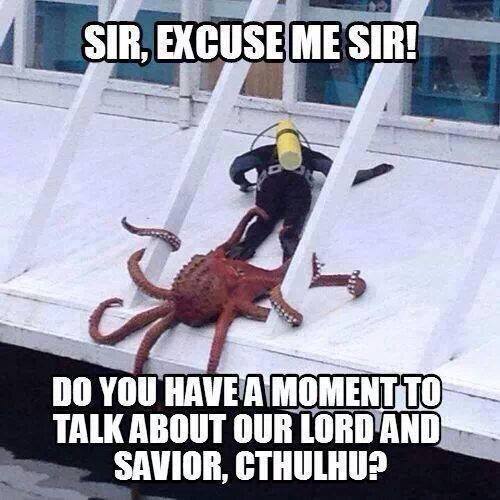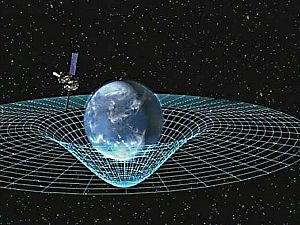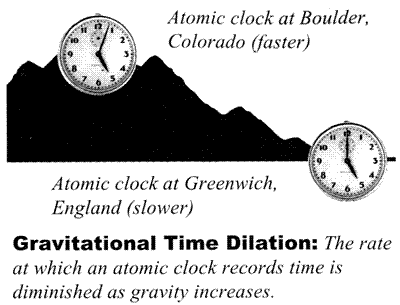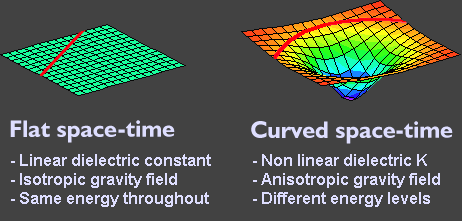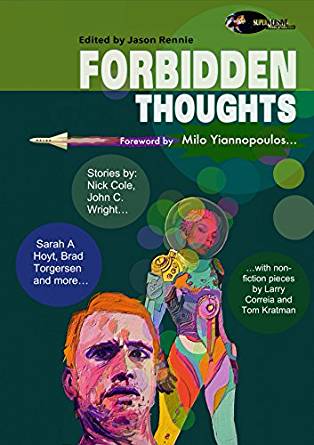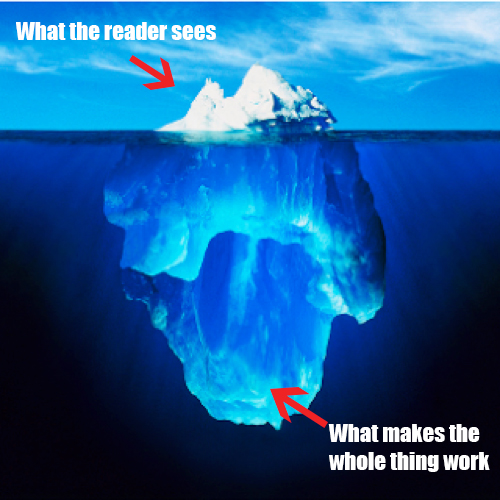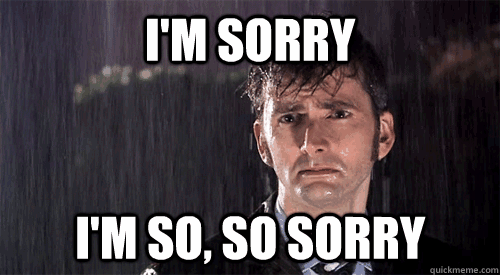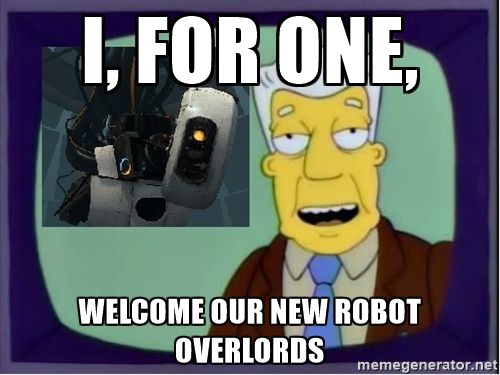First of all, I want to compliment you all on actually writing something. Some of you have actually written works that are better than the stories told in canon. I salute you and hope that you continue your endeavors. Reading your works has been entertaining and enlightening, not to mention gratifying as it reminds me that there are people out there who can speak and write English properly. Yes, you may have the odd spelling mistake, typo, or minor grammar error here and there but that’s only because proofreading your own work is nigh on impossible.

However, there are very few of you in the category above. The rest of this missive is directed at the vast majority of you hanging out on AO3, FF.net, and Tumblr who have kindled my ire to such a degree that I have spent hours watching YouTube videos on how to operate a backhoe so that I can dig a deep enough hole to find fissionable materials in hopes of either 1) escaping the planet we are currently forced to share or 2) blowing up said planet as an act of penance to any superior lifeforms out there who might have stumbled upon your crap.
Let us discuss a few things frankly, escritor a escritor, shall we?
1) Spelling matters. I don’t care what you think. Spelling matters. Word choice matters. I have put down stories because the first paragraph had five or more spelling mistakes that rendered it nearly incomprehensible. Oddly enough, those of you with the worst spelling are the first ones to wonder why you don’t get reviews and to get offended when someone tells you that it’s because you need to use spellcheck.

You don’t want to be this guy, do you?
There is no such thing as “alot.” There is such a thing as “allot” which means “to give or apportion something.” “Of” is a preposition, not a form of “have.” “Accept” means “to welcome, great, or take something in willingly” as in “I accept your apology.” “Except” means “excluding this” or “other than this” as in “You are talented in everything except the ability to use a spellchecker.” Effect is the impact an action or ingredient has upon another thing. Affect is to have an effect. Water has an effect on fire. Fire is affected by water. The difference is subtle but important. You offer apologies in order to apologize to a person; you don’t apologies to them. You lose the love of your life; you let loose the dogs of war. You wait with bated breath. If your breath is baited, then you’ve been eating worms.
A few more before I finish: “it’s” means “it is.” “Its” is possessive. “There” means a place like over there. “Their” means a possession belonging to them such as “their house.” “They’re” means “they are.” “Your” is possessive. “Yours” is also possessive. “Your’s” doesn’t bloody exist. “You’re” means “you are.” “Your welcome to this house of yours shows me that you’re sincere in your desire to make peace.”
If I can get them right, then so can you.
2) Typography and formatting matter. If your idea of formatting is a great big block of text, I’m not reading it. Break it up into paragraphs. A paragraph generally covers one central idea. Also, you may notice that your words appear on a screen and not a sheet of paper and that word-wrapping happens automatically without you needing to hit “Return” at the end of a line. That’s because you are typing on a computer, not a typewriter! That also means that you put only one space after terminating punctuation (and if you don’t know what terminating punctuation is, you are either too young to be reading this blog or you need to go and apologize to every teacher you have ever had).
In electronic publication (meaning “online posting”), there are no indents at the start of a paragraph. Instead, you add an extra linebreak between paragraphs. If you have a change in point-of-view, perspective, or locale within a chapter, you indicate the break in scene with a centered scenebreak. Some writers use “###” but I prefer “~*~*~*~” or “* * *” because the first one is also used at the end of a manuscript to indicate that it is the end.
If you don’t know how to center text, it’s Ctrl + E in just about any word processor I know of. For HTML, if there isn’t a WYSIWYG bar for formatting, it’s <p align=”center”>text to be centered</p>
3) If you write a sex scene, I will be able to tell if you’re experienced or at least consulted with someone experienced. If you aren’t experienced, for the love of Cthulhu, ask someone who is.
I’m fairly certain that this one needs no further explanation. If it does, don’t write sex scenes.

Seriously, if you ask me to explain this one, Godzilla will facepalm and I will headdesk
4) Pick a POV style and, for the love of Galileo, stick with it. The same goes for verb tense, by the way.
If you start off telling the story in first person, stay in first person. The narrator is telling the story from their personal point of view and the reader is only privy to such things as the narrator would know, think, or notice. The narrator is not omniscient and cannot tell what another character is thinking directly. They can, at best, intuit it through facial expressions, body language, or tone of voice. Unless you are writing a psychic or telepathic character, the narrator cannot read minds.
Don’t write stories in second person. Just. Don’t.
If you are writing in third person, decide if you are doing third person limited (deep included), third omniscient, or third limited changing POV. Limited means that the point of view narrator or narrators are limited to one or a few characters. In deep third, you’ll do away with immersion-breaking dialogue indicators and generally will stick to one character as the narrator per book or per chapter. The reader will know only what that character knows but will be privy to information the character does not directly observe or to the intention behind other character’s words, actions, or expressions. In third omniscient, the author shows the motivations and internal monologues of all or most characters. In third limited changing, the narrator is always a character but the point of view character can change from scene to scene.
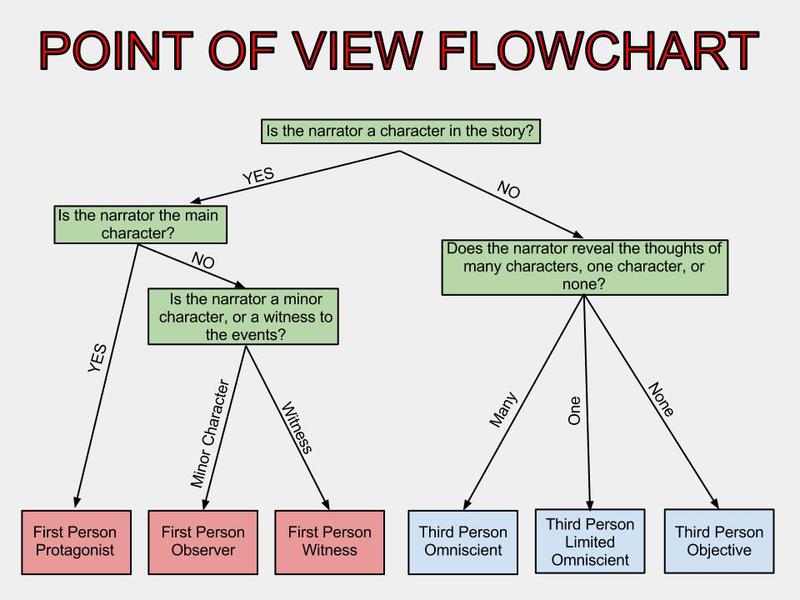
I myself usually write in third limited changing.
With regards to verb tense — past tense, please. Do not write stories in present or future tense. All action in narrative should be past tense. The characters might speak of something they are doing or they will do. They might have an internal monologue in present or future tense. But the actual action of the story should be in the past tense. If you’re not certain of how that works, here’s a sample:
Frank watched as Mitchell prepared the slide. They both wanted to know what had killed their neighbor.
“What do you see, Mitch?” Frank asked after Mitchell had studied the sample for several long, silent moments.
“I see trouble,” Mitchell sighed. “His blood was clean. No poison, no toxins.”
“But there wasn’t a mark on his body. No signs of asphyxiation or strangulation. Healthy men do not just keel over dead!” Frank protested.
“Well, it will take an autopsy to tell you more, Frank. There is not a damned thing on this slide that says he met any kind of foul play.”
Putting that in present tense would be very immersion-breaking. Putting it in future tense would have the reader wondering if you had lost your damned mind.
5) Don’t build in tension needlessly. This one I sometimes have trouble with myself. I’ll want my readers on edge for something but, if you build up tension, there needs to be a release. If you keep people stewing for too long, they will put your work down. If you never have a pay off, they’ll be rather upset. That doesn’t mean you need to rush things; it means you need to check the pacing. It also means you don’t throw in a bunch of tangential tragedies or misunderstandings just to keep people on tenterhooks. And yes, it is “tenterhooks” and not “tenderhooks.”
Pacing matters. If you’re writing a slow burn love story, you don’t have the characters get together in the second chapter. You also don’t have them get together in the very last chapter (at least not for the first time). If you’re writing an adventure, your heroes do not beat the Super Villain at the end of chapter one. They also don’t beat him in the penultimate or ultimate chapter. If the last damned line of your story is “the good guys won over the bad guys,” I will personally hunt you down and beat you within an inch of your life.
6) Beta readers are not all editors and editors are not beta readers. Yes, good betas will generally point out typos, misspellings, and grammar errors. However, their job is primarily to give you feedback on how well the chapter progresses the story, how plausible the actions and inner monologues are, how in-character things are, and to help you with internal consistency. Editors, on the other hand, are going to focus on grammar, spelling, word choice, and the way that paragraphs flow and transition. They may not notice internal inconsistencies or your characters doing things completely out of character for them. I can and have done both but they are different processes so I have to focus on one during one read-through and the other during the second.
7) Content labels are fine. Trigger warnings are stupid. It is fine to label your story with content warnings such as “swearing,” “non con,” “M/M,” “F/F,” “F/M,” or the like. Certain people may not want to read a story with a lot of swearing or a lot of sex or certain kinds of pairings. That’s fine. But trigger warnings are stupid and show that you are ignorant about what PTSD actually is and how it works.
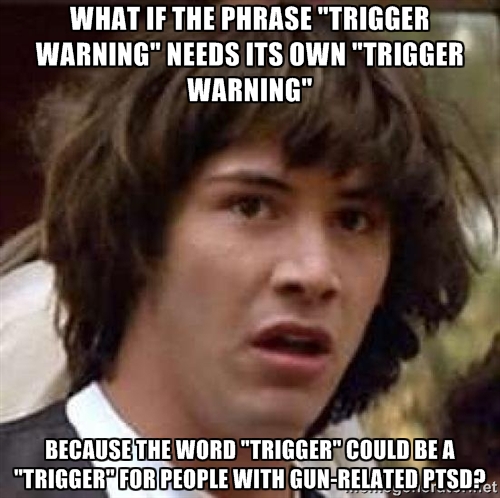
If someone is “triggered” by words on a page, then they probably should be institutionalized. Most people with PTSD will never be triggered by mere words on a page. It will be sounds (such as explosions or gunfire), smells, or conditions that are physically occurring around them that trigger them to have a flashback episode. This is why concert venues, movie theaters, and other live performances will sometimes give warnings that the event taking place will involve gunfire, explosions, pyrotechnics, or sudden loud noises. Treatment for PTSD involves gradually re-exposing the person to the things that trigger them so that they will become desensitized to them and will no longer be triggered to have a flashback whenever a car backfires.
So, unless you are embedding video in your story, it doesn’t need a trigger warning. A content label will do fine for those who wish to avoid certain types of stories. Putting a trigger warning in it only diminishes and makes light of actual PTSD.
How do I know this? One, I have read up on PTSD and treatment for it. Two, I have friends who have gone through it. Three, I have dealt with a mild case of it myself in the months after I was carjacked and kidnapped at gunpoint. That’s how I know.
8) Again, for the love of Cthulhu, learn what certain idiomatic expressions actually are as opposed to what you’ve misheard them as. The phrase is “for all intents and purposes” not “for all intensive purposes.” “Irregardless” isn’t a word — you’re looking for “regardless.” “Literally” means that something could actually happen the way described. “Could care less” means that you do care to some degree.
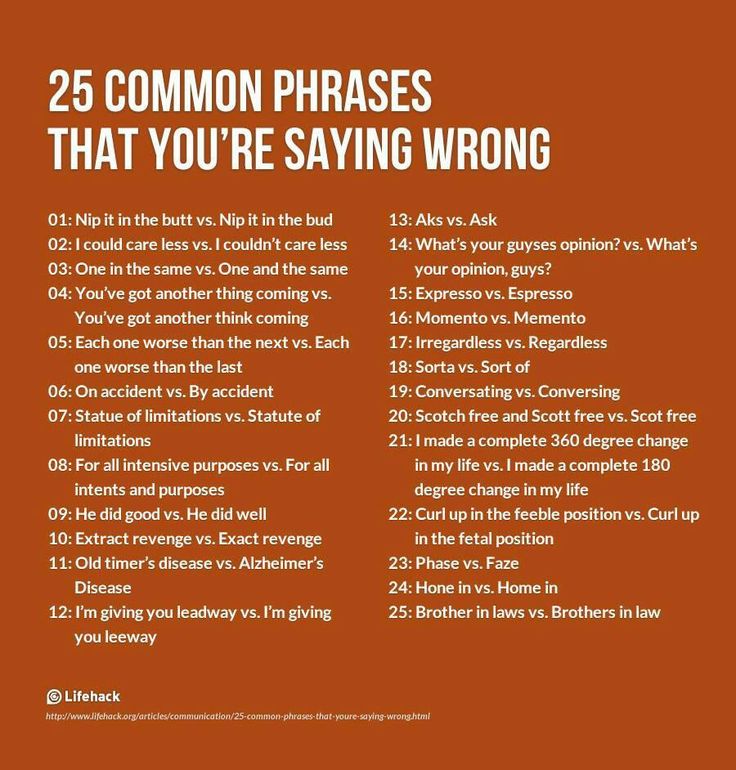
This list is, of course, not comprehensive or all-inclusive. However, it covers the most common mistakes I’ve seen. Please try to do better in the future because I am very frightened that some of you might represent fan-writers to the general public.
Hugs and kisses!
— G.K.













